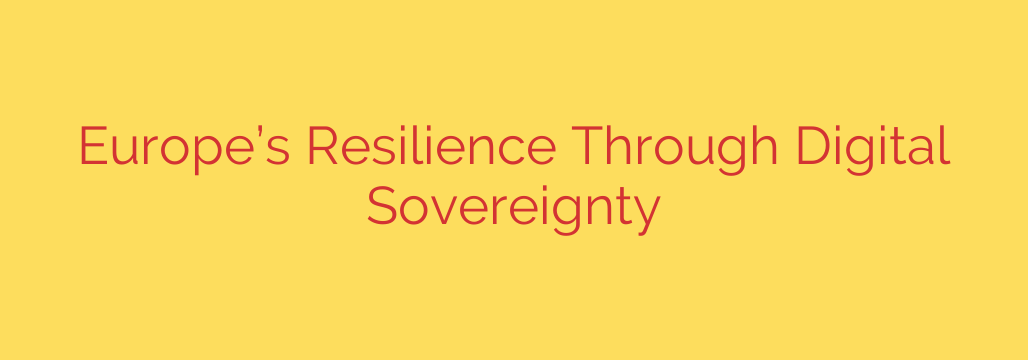
Building a Digital Fortress: How Europe is Securing Its Technological Future
In today’s interconnected world, the digital infrastructure that powers our economies and societies is as critical as our physical roads and power grids. From cloud computing and data analytics to artificial intelligence, our reliance on technology is absolute. This has raised a crucial question for nations and continents alike: Who controls this digital backbone? For Europe, the answer is increasingly clear—it must be Europe itself. This strategic imperative is known as digital sovereignty.
In simple terms, digital sovereignty is the ability of a state or region to have control over its own digital destiny. This means governing its own data, developing its own technological capabilities, and setting its own rules for the digital world, free from the undue influence of foreign powers. It isn’t about digital isolationism; rather, it’s about building resilience, ensuring security, and promoting economic competitiveness in a world dominated by a few tech superpowers.
The Wake-Up Call: Understanding Europe’s Digital Dependence
For years, Europe has been a major consumer of digital services, but not a dominant producer. The vast majority of cloud services, social media platforms, and data processing are handled by companies based outside the European Union. This has created significant vulnerabilities.
This over-reliance on a few foreign technology providers creates several risks:
- Security Vulnerabilities: When critical data—from government records to corporate secrets and personal information—is stored on servers subject to foreign laws, it can be accessed by foreign governments.
- Economic Disadvantage: Profits and innovation are concentrated outside the EU, potentially stifling the growth of a homegrown European tech ecosystem.
- Lack of Control: Geopolitical tensions can threaten access to essential digital services, leaving European businesses and governments in a precarious position.
The Blueprint for a Sovereign Digital Europe
To counter these risks, the EU is pursuing a multi-faceted strategy built on three core pillars: robust regulation, strategic investment in infrastructure, and a commitment to European values.
Robust Regulatory Frameworks: Europe has led the world in creating a rulebook for the digital age. By setting clear standards, the EU ensures that any company operating within its borders must adhere to its principles of fairness, transparency, and data protection. This creates a level playing field and protects citizens.
Investing in Homegrown Infrastructure: Regulation alone is not enough. Europe is actively promoting the development of its own secure and competitive digital infrastructure. This includes supporting European cloud providers and fostering initiatives designed to create a federated, interoperable system that offers a real alternative to the current market leaders. The goal is not to replace foreign providers entirely but to ensure viable, secure European alternatives exist.
Championing European Values: At its heart, Europe’s push for digital sovereignty is about embedding its values—such as privacy, free speech, and democratic oversight—into the very fabric of technology. It represents a “third way” between the largely unregulated, market-driven model of the US and the state-controlled model of China.
Key Initiatives Paving the Way
Several landmark policies and projects are turning this vision into a reality:
- The General Data Protection Regulation (GDPR): The most well-known example, GDPR, set a global standard for data privacy and gave individuals significant control over their personal information.
- The Digital Services Act (DSA) & Digital Markets Act (DMA): These regulations aim to create a safer and more open digital space. The DSA tackles illegal content and disinformation, while the DMA targets the anticompetitive practices of the largest digital “gatekeepers,” promoting fairness and innovation.
- GAIA-X: This is a flagship project to build a federated, secure, and sovereign data infrastructure for Europe. It aims to connect different cloud providers under a common set of rules and standards, allowing data to be shared and processed securely while maintaining European control.
What This Means for You: Security in a Sovereign Digital Age
The drive for digital sovereignty has practical implications for both businesses and individuals. Adopting a security-first mindset is no longer optional.
Actionable Security Tips for Businesses:
- Know Your Data’s Home: Understand where your company’s and customers’ data is stored and processed. Prioritize providers who offer data residency within the EU to ensure compliance with GDPR.
- Diversify Your Providers: Avoid relying on a single non-EU provider for all your critical infrastructure. A multi-cloud or hybrid-cloud strategy can increase resilience.
- Vet Your Vendors: Choose technology partners who are transparent about their security practices and demonstrate a clear commitment to European data protection standards.
Actionable Security Tips for Individuals:
- Manage Your Privacy Settings: Regularly review the privacy settings on your social media accounts, apps, and devices. Limit the data you share.
- Choose Privacy-Focused Alternatives: Whenever possible, opt for services (like search engines, browsers, and messaging apps) that are built with privacy as a core feature.
- Be Aware of Data Transfers: Understand that using services from non-EU companies often means your data is being transferred abroad. Read privacy policies to make informed choices.
By pursuing digital sovereignty, Europe is not building a digital wall. Instead, it is laying the foundation for an open, secure, and competitive digital single market that reflects its core values. It is a long-term strategic project to ensure that Europe’s future is not just digital, but also resilient and self-determined.
Source: https://www.helpnetsecurity.com/2025/07/25/benjamin-schilz-wire-european-digital-sovereignty/








